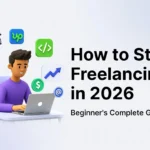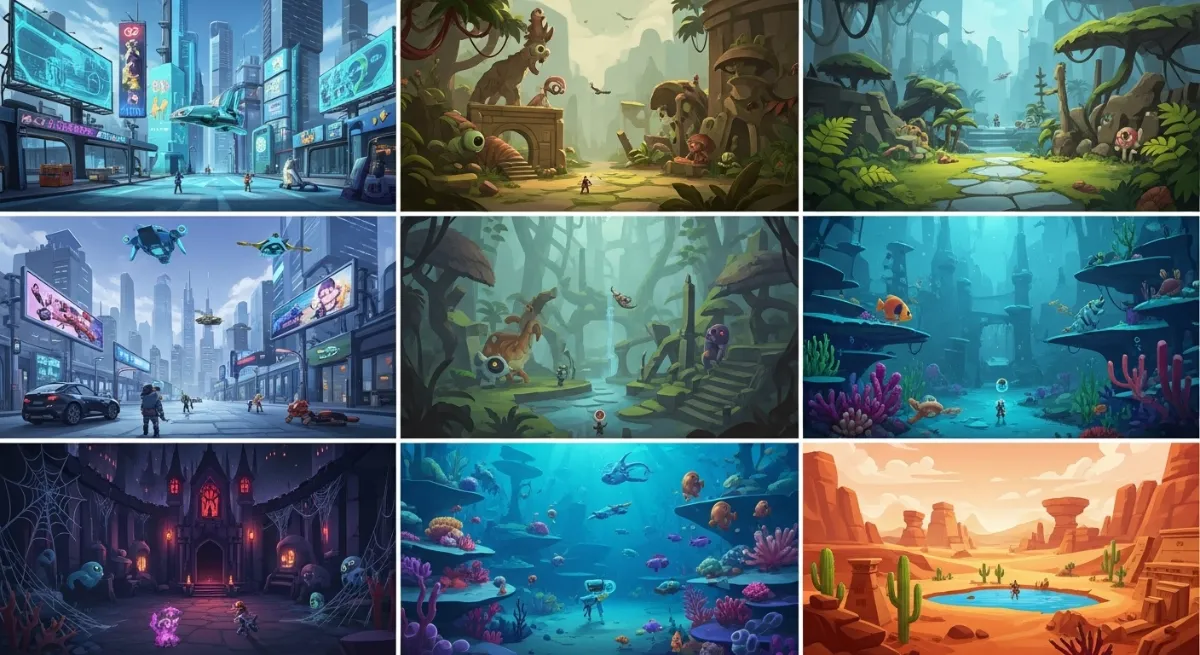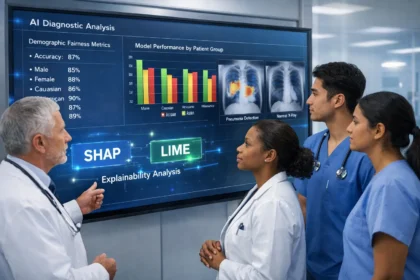Introduction: Technology and business needs are changing fast. In 2025, skills like Artificial Intelligence (AI), data analysis, and digital marketing will be in high demand worldwide. The good news is you can learn all these skills online for free. Many major platforms (Coursera, edX, Khan Academy, YouTube, etc.) offer free courses and tutorials. This blog covers 10 top skills, simple definitions, real examples of how they’re used in jobs or freelancing, and links to free courses or tools to learn them. Let’s dive in!
- 1. Artificial Intelligence (AI) & Generative AI
- 2. Data Analysis & Excel Skills
- 3. Programming (Coding)
- 4. Web Development
- 5. User Experience (UX) & User Interface (UI) Design
- 6. Digital Marketing & SEO
- 7. Graphic Design & Multimedia Creation
- 8. Video Editing and Production
- 9. Cybersecurity Awareness and Basics
- 10. Project Management and Organizational Skills
- Frequently Asked Questions (FAQs)
1. Artificial Intelligence (AI) & Generative AI
What is AI? AI means teaching computers to think and learn. It includes machine learning and the new “generative” AI (like ChatGPT) that can create text or images. AI tools help companies work faster and smarter. For example, Amazon uses AI to recommend products and Netflix uses it to suggest shows. Learning AI means you could work on AI engineer or data scientist teams.
- Why it’s hot: AI skills are in high demand. WEF data says “AI and big data” will be high in-demand skills in the next 5 years. Big companies (Google, Microsoft, IBM) already use AI in products and services.
- Jobs/Freelance: AI careers include AI Engineer, Machine Learning Specialist, and AI Product Manager. (Glassdoor lists AI Engineer salaries around $133K.) As a freelancer, you could build AI chatbots or image generators for clients. Entrepreneurs are creating AI-based tools (e.g. a custom chatbot for customer support).
- Learn it free: Many free courses teach AI basics. For example, Coursera’s Introduction to Generative AI (by Google Cloud) is free to audit and covers how generative AI works. Microsoft’s AI School (free at Learn.Microsoft.com) and IBM’s free AI Foundations courses are also great. YouTube channels like freeCodeCamp and CrashCourse AI explain AI in easy terms. Many AI tools are free to try (e.g. Google’s TensorFlow tutorials, or OpenAI’s Playground).
AI tools (like ChatGPT) use computer “brains” to learn. AI jobs (engineer, developer) pay well. Free AI courses: Coursera, edX, Microsoft Learn, YouTube.
2. Data Analysis & Excel Skills
What is Data Analysis? Data analysis means looking at information (numbers, tables, stats) to find useful answers. For example, a store might analyze sales data to decide what to stock. Companies rely on data to make decisions. Being good at Excel, Google Sheets, or tools like Tableau and Python helps turn raw data into charts or reports.
- Why it’s hot: All businesses need data people. The Coursera team notes companies “increasingly rely on data” for decisions. Skills in Excel or SQL let you spot trends that save money or grow sales. For example, an analyst might show that a new marketing campaign increased customers, so the company invests more.
- Jobs/Freelance: Data jobs include Business Analyst, Data Analyst, and Data Scientist. (Glassdoor lists Data Analyst jobs at about $111K.) Freelancers often do market research or create dashboards for small companies. Even running your own online store or YouTube channel is easier with data skills (to track visitors or sales).
- Learn it free: You can start with free courses. Google offers a Data Analytics Certificate (free on Coursera with financial aid). Khan Academy and YouTube have tutorials on Excel formulas and charts. Try Coursera’s Excel Skills for Business or free videos by ExcelIsFun. Learn SQL basics at Khan Academy’s free SQL course or freeCodeCamp. Many online datasets (like Kaggle) let you practice analysis for free.
3. Programming (Coding)
What is Programming? Programming means writing instructions (code) that tell computers what to do. Apps, games, websites, and many devices work because someone coded them. Common languages are Python, JavaScript, and Java. Learning to code opens up building anything digital – from apps to websites to robots.
- Why it’s hot: Nearly every industry uses software now. The Coursera article notes companies regularly turn to technology and need people to develop and improve it. Even doctors, designers, and marketers often use simple code or tools like WordPress. Sites like Stack Overflow and GitHub exist because coders build products together.
- Jobs/Freelance: Programmers are everywhere. Roles include Software Engineer, Web Developer, App Developer, DevOps Engineer. For example, Glassdoor shows Software Engineers at $163K on average. Many small businesses hire freelance programmers to build or fix websites and apps. Creating your own software or selling code templates is also an option.
- Learn it free: There are tons of free coding resources. Try Codecademy’s free courses or freeCodeCamp (both free). Coursera and edX let you audit top university courses like Harvard’s CS50 (free on edX) or MIT’s Intro to Computer Science. YouTube channels (Traversy Media, The Net Ninja) teach hands-on projects. For Python, the official Python tutorial and Kaggle are great, and new coders can use free editors like Visual Studio Code.
Programming (writing code) is needed to build websites, apps, and software. Free coding courses on platforms like Coursera, edX, Codecademy, and YouTube can teach you basic Python, JavaScript, etc.
4. Web Development
What is Web Development? Web development combines coding and design to make websites and web apps. It includes front-end (what users see in a browser) and back-end (the server/database behind it). A web developer knows languages like HTML, CSS, JavaScript, and tools like Git or WordPress.
- Why it’s hot: Every business needs a website or web service. The Coursera article notes web development “brings together the fundamentals of software development and user experience”. Having web dev skills means you can create anything from a personal portfolio site to a full e-commerce store with payment processing. Even small shops hire developers to improve their sites for better sales (via SEO or mobile-friendliness).
- Jobs/Freelance: Common roles are Front-End Developer, Full-Stack Developer, Webmaster. For example, Front-End Developers earn about $103K. Freelance web developers build websites or fix bugs for clients (shops, blogs, nonprofits). An entrepreneur might launch a custom online store or web app using these skills.
- Learn it free: Free resources are abundant. freeCodeCamp has a full free curriculum for responsive web design and front-end libraries. Coursera’s Web Design for Everybody (free to audit) and edX’s HTML5 and CSS Fundamentals teach the basics. Mozilla’s MDN Web Docs and YouTube (e.g. Traversy Media’s “Build a Website” tutorials) are also great. Many tools like CodePen and GitHub are free and let you practice live.
5. User Experience (UX) & User Interface (UI) Design
What is UX/UI Design? UX design means figuring out the best way for people to use a product (like an app or website). UI design means creating the actual look and feel (buttons, layout, colors). Together, UX/UI designers make digital tools easy and pleasant to use.
- Why it’s hot: As tech grows, making products user-friendly is key. The WEF notes “design and user experience” skills are highly valued. Good UX/UI can make or break an app: think how easy apps like Instagram or Zoom are to navigate. Employers (and users) pay more for software that “just works” and looks nice.
- Jobs/Freelance: Jobs include UX Designer, UI Designer, Product Designer. These roles often involve doing user research and designing prototypes. They pay well ($77–$126K on average). Freelancers create app mockups, icons, or improve websites’ layouts for clients. Entrepreneurs can use UX principles to make better websites or apps (leading to happier customers and more sales).
- Learn it free: You can learn UX/UI online at no cost. Google’s free UX Design Certificate (audit free) teaches the basics. YouTube has tutorials on tools like Figma and Adobe XD. Coursera’s Intro to User Experience is free to audit. Websites like Interaction Design Foundation and blogs explain design thinking simply. Also try building your own designs in free tools like Figma or Canva to practice.
6. Digital Marketing & SEO
What is Digital Marketing? Digital marketing means promoting products or services online. It includes SEO (making websites rank higher in Google), social media marketing, email campaigns, content writing, and more. Simply put, it’s using the Internet to find customers and grow a brand.
- Why it’s hot: All companies need online customers. The Coursera article points out content and marketing skills are crucial for jobs. With over 4 billion people online, being able to reach them is a superpower. Every small business wants to show up in search results and social media. Knowing SEO or social media marketing can make you valuable: for instance, improving a site’s Google ranking or making a viral Instagram campaign.
- Jobs/Freelance: Digital marketing roles include Social Media Manager, SEO Specialist, Content Marketer. (Glassdoor notes Social Media Managers around $56K.) Freelancers and entrepreneurs often create marketing content – writing blog posts, making Facebook ads, or optimizing websites. A freelance digital marketer might help a shop set up Google Ads or plan Instagram posts.
- Learn it free: Free courses abound. Google’s Digital Garage offers a free Fundamentals of Digital Marketing certificate. HubSpot’s free courses teach content and SEO. YouTube channels (Neil Patel, Moz) explain SEO simply. Platforms like Coursera’s Digital Marketing Specialization allow free auditing. Tools like Google Analytics and Search Console are free ways to practice analyzing web traffic.
Online marketing skills and SEO tools (SEO, social media, ads) help businesses grow. Free courses (Google Digital Garage, HubSpot Academy, Coursera audit) teach you how to run campaigns and analyze results.
7. Graphic Design & Multimedia Creation
What is Graphic Design? Graphic design is making visual content – logos, posters, infographics, social media images. It uses tools like Photoshop, Illustrator, or free sites like Canva. In 2025, visual content is everywhere: businesses, blogs, YouTube thumbnails, even TikTok videos.
- Why it’s hot: Every brand needs graphics. From a startup’s logo to a teacher’s presentation, design makes information clearer and more attractive. Even marketing is a type of design. Good design skills help your work stand out online. For example, a beautifully designed infographic can go viral and drive new followers or customers.
- Jobs/Freelance: Graphic designers work as Brand Designer, Illustrator, or Social Media Graphics Creator. Freelancing is common: people hire designers to make flyers, book covers, or social posts. You can also sell designs online (e.g. Print-on-Demand mugs or T-shirts). Many small businesses need someone who can design ads or menus.
- Learn it free: Start with free tutorials. Canva’s Design School teaches basics of color, layout and its tool (free to use). YouTube has many graphic design channels (Flux, TJ FREE). Coursera’s Fundamentals of Graphic Design (CalArts) is free to audit. Try free software like Canva or GIMP to practice. Online communities (Reddit’s r/DesignCourse) share tips and resources.
8. Video Editing and Production
What is Video Editing? Video editing is cutting and arranging video clips, adding effects, music, and text to make a finished video. With social media and YouTube booming, video skills are very useful. It could be editing smartphone footage or professional clips.
- Why it’s hot: Video is the most-shared content online. Companies need video ads, tutorials, or social videos. Good editing makes content look professional. For example, a YouTuber or company might hire an editor to trim raw footage, add titles, and fix colors. Video editors can also freelance for events (wedding videos, for instance).
- Jobs/Freelance: Roles include Video Editor, Motion Graphics Designer, YouTube Content Creator. Freelancers often edit videos for weddings, promos, or social media campaigns. Entrepreneurs use video to market products (a great product demo video). The rise of platforms like TikTok means anyone can use video skills to grow a brand.
- Learn it free: Many free tools exist: DaVinci Resolve is a professional-grade editor that’s free. HitFilm Express and OpenShot are also free. Free courses on YouTube (Film Riot, Justin Odisho) teach editing basics. Coursera/edX have courses like Video Production (audit free). Adobe offers limited free trials/tutorials for Premiere. Even smartphone apps (like VN or InShot) let you practice editing on a phone.
9. Cybersecurity Awareness and Basics
What is Cybersecurity? Cybersecurity means protecting computers, networks, and data from attacks. With more life happening online, keeping things safe is vital. It covers using strong passwords, recognizing scams, and even programming defenses (like firewalls).
- Why it’s hot: Cyber attacks keep increasing, so experts say there is a big skills gap in security. The World Economic Forum reports that since 2024, “two in three organizations” don’t have enough security-trained staff. In other words, people who know how to keep data safe are urgently needed. Even small tasks like securing your own social media account or blog are part of this skill set.
- Jobs/Freelance: Common roles include Cybersecurity Analyst, Network Security Specialist, Ethical Hacker. The U.S. Bureau of Labor Statistics projects information security jobs will grow 33% from 2023–2033 (much faster than average). Freelancers can offer services like setting up secure Wi-Fi for small businesses or checking websites for vulnerabilities. Entrepreneurs can start small security firms or create security apps (like password managers).
- Learn it free: Start with basics online. Cybrary and Cisco’s free courses (Networking Academy) teach fundamentals. Coursera’s Cybersecurity Specialization (audit free) covers key concepts. Google also offers free security courses on Google Cloud. YouTube channels (e.g. Cyber Mentor) explain hacking tools ethically. Microsoft Learn has a Security, Compliance, and Identity learning path for free. Even tutorials on setting up firewalls or antivirus help practice.
A digital padlock icon represents cybersecurity. Jobs like Cybersecurity Analyst are growing fast (33% growth by 2033). Free security courses: Cisco Networking Academy, Cybrary, Coursera (audit free).
10. Project Management and Organizational Skills
What is Project Management? Project management means planning, organizing, and overseeing a task or project. This includes setting goals, timelines, and budgets, and making sure team members communicate well. Good project managers keep projects on track and everyone aligned.
- Why it’s hot: Every team needs organization. When companies build products, launch marketing campaigns, or plan events, they need someone to keep all the pieces moving smoothly. Project managers make sure work gets done on time and solve problems along the way. Even freelancers and small businesses use these skills: for example, an online shop owner might manage inventory and promotions like a project.
- Jobs/Freelance: Jobs include Project Coordinator, Project Manager, Program Manager. Glassdoor shows Project Manager around $137K. Freelancers and entrepreneurs often act as their own project managers (setting schedules, tracking progress). Many tech and business roles list “project management skills” as valuable, even if the job title isn’t “manager”.
- Learn it free: There are free courses on basics like Agile and Scrum. Coursera’s Introduction to Project Management (audit free) and edX’s Project Management courses help you learn planning tools and techniques. YouTube has tutorials on tools like Trello or Asana for free. Google’s Project Management Certificate (free audit) covers organizing projects. Even TED-Ed videos explain time management and team work for free.
Conclusion: These 10 skills – ranging from tech to creative to management – are in high demand globally in 2025. Best of all, you can learn them online for free. Use the free courses and resources linked above to start learning. With practice and persistence, you can build impressive abilities (and even certificates) at no cost. These new skills not only prepare you for great jobs but also empower you to start your projects or businesses. In a world where learning and work are changing fast, free online learning lets anyone keep up. Good luck on your learning journey!
Frequently Asked Questions (FAQs)
1. What are the most in-demand skills to learn for free in 2025?
In 2025, the most in-demand skills include Artificial Intelligence (AI), coding, digital marketing, data analysis, graphic design, video editing, and communication skills. These are useful in many jobs and can be learned for free online.
2. Can I learn these skills for free online?
Yes, many websites like Coursera, edX, Khan Academy, and YouTube offer free courses and tutorials on these skills. Some even give you free certificates after completion.
3. Do I need a computer science degree to learn tech skills like coding or AI?
No, you don’t need a degree. Anyone with basic internet access and the will to learn can start. Many free courses start from beginner level and teach step by step.
4. How can these skills help me earn money?
You can work as a freelancer, start a YouTube channel, create digital products, or apply for remote jobs. Skills like graphic design, digital marketing, and coding are in high demand worldwide.
5. Is there any age limit to learn these skills?
No, there is no age limit. Whether you’re a student, a homemaker, or a retired person, you can start learning today. Age doesn’t matter—skills do.












I wish I could be opportuned to learn a skill here! 🥺